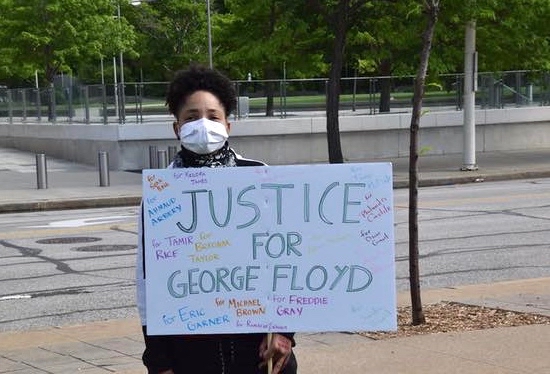
People all across the U.S. and around the world no doubt slept better after Tuesday’s verdicts in the murder trial of Derek Chauvin, who was charged with keeping his knee on the neck of George Floyd for 9 minutes and 29 seconds last Memorial Day. Chauvin was convicted on all three counts: second-degree unintentional murder; third-degree murder; and second-degree manslaughter.
However, just as the verdict was being announced in a courtroom in Minneapolis, reports were coming out of Columbus, Ohio, of a cop shooting and killing a 16-year-old black female who allegedly was armed with a knife and was swinging it at another female. The swift reaction of activists in Columbus clearly demonstrates how far we have to go in terms of restoring trust between police and black communities.
Was the cop justified in using deadly force against Ma’khia Bryant? Could other, less deadly, techniques have been utilized to defuse the situation? The simple truth is, relations between cops and black communities across the country are so frayed that getting at the truth when an incident of this type occurs is exceedingly difficult. It often comes down to whose version of the truth you believe — the cops or the citizens.
A bill currently under consideration in Congress, H.R.7120 — the George Floyd Justice in Policing Act of 2020 — seeks to address this issue and a wide range of policies and other issues regarding policing practices and law enforcement accountability. It includes measures to increase accountability for law enforcement misconduct, to enhance transparency and data collection, and to eliminate discriminatory policing practices.
“The bill facilitates federal enforcement of constitutional violations (e.g., excessive use of force) by state and local law enforcement. Among other things, it does the following:
- Lowers the criminal intent standard — from willful to knowing or reckless — to convict a law enforcement officer for misconduct in a federal prosecution.
- Limits qualified immunity as a defense to liability in a private civil action against a law enforcement officer or state correctional officer.
- Authorizes the Department of Justice to issue subpoenas in investigations of police departments for a pattern or practice of discrimination.
The bill also creates a national registry — the National Police Misconduct Registry — to compile data on complaints and records of police misconduct. [This component of the bill is critical since it would prevent a cop that was fired in one jurisdiction from simply being hired by another police department.]
It establishes a framework to prohibit racial profiling at the federal, state and local levels. The bill establishes new requirements for law enforcement officers and agencies, including to report data on use-of-force incidents, to obtain training on implicit bias and racial profiling, and to wear body cameras.
While this bill would go a long ways towards reestablishing trust between police and the citizenry across the country, it faces tough sledding in the Senate where Republicans are set to block virtually any measure put forth by Democrats. It’s past time for progressives in Congress to get rid of the antiquated filibuster that Republicans use to block progress.

From CoolCleveland correspondent Mansfield B. Frazier mansfieldfATgmail.com. Frazier’s From Behind The Wall: Commentary on Crime, Punishment, Race and the Underclass by a Prison Inmate is available in hardback. Snag your copy and have it signed by the author at http://NeighborhoodSolutionsIn